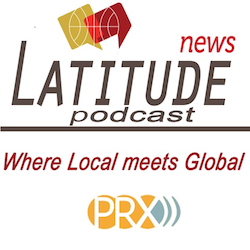 Plenty of media organizations share the goal of putting more international news in front of American audiences. Maria Balinska takes that goal and tweaks it slightly for her startup, Latitude News: “What we want to be looking at are stories people in the United States can relate to in other parts of the world.”
Plenty of media organizations share the goal of putting more international news in front of American audiences. Maria Balinska takes that goal and tweaks it slightly for her startup, Latitude News: “What we want to be looking at are stories people in the United States can relate to in other parts of the world.”
Relatability, Balinska argues, is key because it puts global news in a frame that feels less, well, foreign. Latitude News is now trying to expand its approach to international news through a partnership with PRX.
Thanks to funding from the Open Society Foundations, Latitude News and PRX are producing 12 podcasts and broadcast segments that showcase global stories that link back to people and communities here in the U.S. As one of the largest distributors of audio storytelling, PRX has the ability to put Latitude on iPhones, Androids, and public media stations across the country.
The shows are hosted by Dan Moulthrop and have a sound that blends the loose, conversational, nature of podcasting with a structure that borrows cues from public media programs. So far, two episodes have been produced, one looking at the ties between U.S. evangelicals and anti-gay measures in Uganda, the other connecting cod fishing in Norway and the United states.
Balinska, a former Nieman Fellow and 20-year veteran of the BBC, said audio storytelling was natural to her, which is why she wanted to make it a part of Latitude. “Generally speaking, I think audio engages people in a particular way that is different from video and print,” Balinska said. More specifically, Balinska said the nature of audio stories — whether in your car, at home or in your headphones — is a stylistic fit with her goal of telling relatable stories. A podcast is the right vehicle for deeper, non-traditional, stories, because in order to consume it a listener has to spend time with it. “Think about the classic model of storytelling: two people sitting down over a cup of tea or glass of wine, recounting to one another,” she said. “That is the basic element of storytelling.”
Looking at Latitude News’ site, you get a clear sense of how they approach international news. An analysis of President Obama and Mitt Romney’s stance on wind power is put in perspective by examining foreign companies that manufacture wind turbines overseas. A story on the Russian punk band Pussy Riot makes connections to a local band in Boston and musicians like Madonna and the Red Hot Chili Peppers.
With newsrooms shrinking, locally driven international coverage has taken a big hit in newsrooms. While newspapers can still rely on wire services like AP to deliver global news, Balinska said those typically fail to provide something a reader can relate to. Balinska launched Latitude News last fall, with support from the International Women’s Media Foundation among others, to build a bridge between local news and global news. “I felt there was a real gap in the market for stories and coverage that actually broke down the barriers and the silos in the newsroom from the local desk and the foreign desk,” she said.
The partnership with PRX will likely expose Latitude to new audiences. John Barth, managing director of PRX, told me at least one public radio station, Seattle’s KUOW, has already used a Latitude segment on air.
Barth said the grant from the Open Society Foundations was for the specific purpose of broadening international coverage to American audiences. Rather than funding a traditional newscast, Barth said they wanted to find new voices and new approaches to international news.
“One of the challenges is drawing connections between foreign stories and domestic issues here on a human and one-on-one level,” Barth said. “That’s one of the reasons that makes this so relevant.”